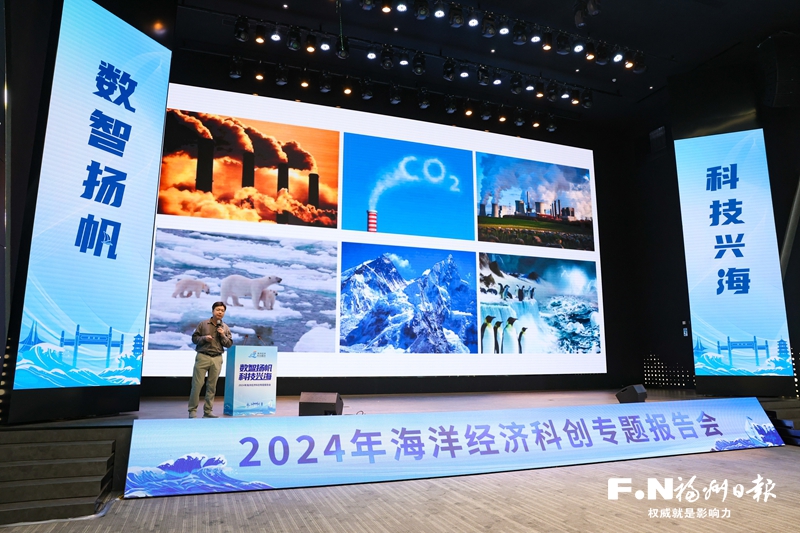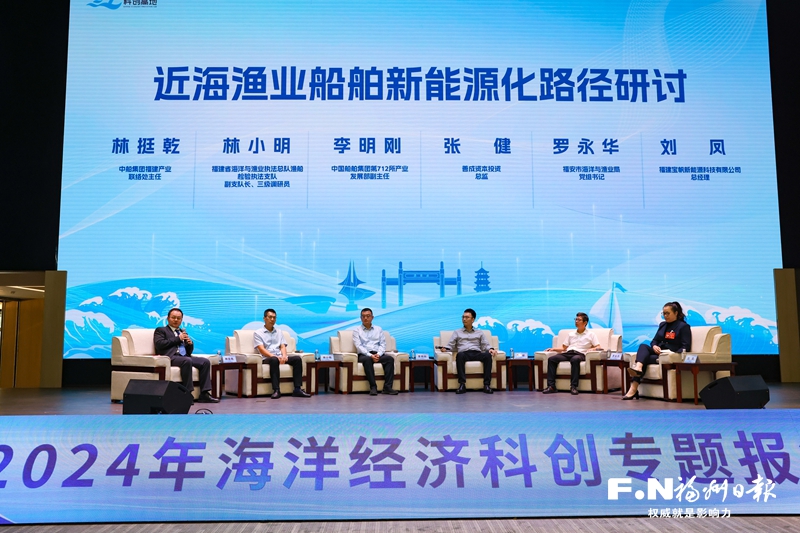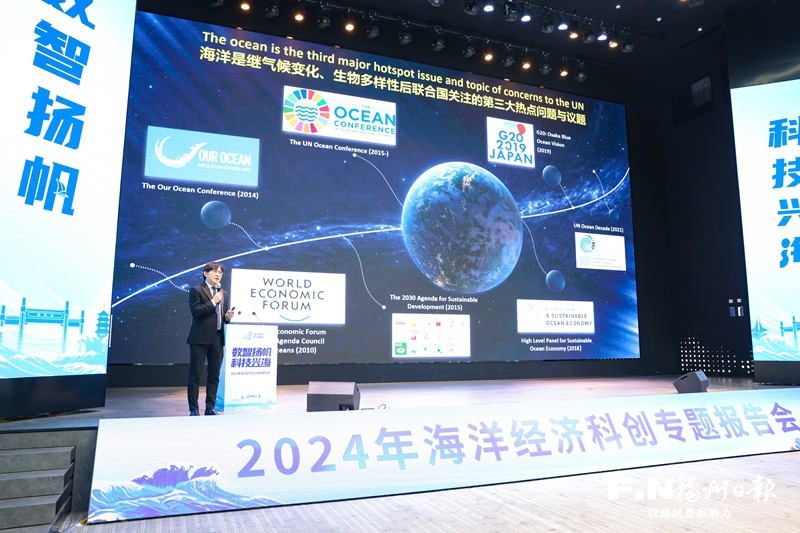What does the future look like? Some say the future gradually unfolds through innovation. On the morning of November 16, during the World Maritime Equipment Conference 2024, the Seminar on Scientific Innovation for Marine Economy was held at the Maritime Sci-Tech Competition Center. The event was hosted by the Fuzhou Municipal People’s Government and the Fujian Provincial Bureau of Ocean and Fishery, with the CPC Gulou District Committee and the People’s Government of Gulou District serving as the organizers. Experts and representatives from related industries gathered to explore a sustainable future, guided by technological innovation, in the pursuit of a deep blue dream.

Xiong Shusheng, foreign academician of the Russian Academy of Engineering and director of the Longquan Industrial Innovation Research Institute at Zhejiang University, delivered a keynote speech. Xie Yunxing / Photography
Frontier Dialogue:
“Carbon” as the Key to a Sustainable Blue Economy
The vast blue sea holds limitless potential.
“The ocean plays a core role in addressing climate change and other challenges. However, its actual value could be much higher, as many critical ecosystem services are difficult to quantify,” said Dai Minhan, member of the China Council for International Cooperation on Environment and Development, Academician of the Chinese Academy of Sciences, and Chair Professor at Xiamen University. He introduced that the goal of the marine policy research at the 7th Conference of China Council for International Cooperation on Environment and Development is to explore how to govern the oceans comprehensively and sustainably to maximize the synergistic effects between the blue economy and carbon neutrality.
If the ocean were considered a country, the total value of its products and services would be equivalent to the “seventh largest economy in the world.” Dai Minhan pointed out that China places great emphasis on developing a sustainable blue economy, but it is still in the early stages of maturity. “It is recommended to actively advance carbon neutrality while incorporating a sustainable blue economy into the top-level policy framework, defining its principles, and integrating it into the next Five-Year Plan to effectively promote the blue transformation of the marine economy.”
“In the world’s major economies, China will achieve carbon peak and carbon neutrality in the shortest time in history, with the heaviest task," said Xiong Shusheng, foreign academician of the Russian Academy of Engineering and director of the Longquan Industrial Innovation Research Institute at Zhejiang University. He emphasized that only by developing new energy power can we bypass the technological barriers and energy barriers of developed countries and hope to achieve a “lane change and overtaking” in the global energy transition.
In the context of the carbon peaking and carbon neutrality targets, Xiong Shusheng discussed the development path for green new energy vessels with the attendees. He proposed the construction of a three-in-one industrial base for the manufacturing, service, and research and development of new energy vessels. This includes creating a national-level ship component manufacturing base to promote industrial development and technological innovation through industry clustering; establishing nationally recognized new energy vessel evaluation laboratories to provide a range of testing services; and setting up an industry-university-research innovation platform, collaborating with renowned universities to form a new type of innovation entity, driving the rapid development of green vessels.

At the Roundtable seminar, Guests Discuss the Path to New Energy for Nearshore Fishing Vessels.Xie Yunxing / Photography
Sailing Towards the New:
Witnessing the Release of Achievements and Signing of Projects
We set sail with digital intelligence and advance our maritime ambitions. At the event, representatives from enterprises, financial institutions, and universities took turns on stage, unveiling achievements and signing projects, collectively forming an unstoppable tide.
“Green intelligent technologies for vessels are leading the future development of the maritime industry,” said Chen Zhuo, a researcher at the 712th Research Institute of China State Shipbuilding Corporation Limited, and technical director at Wuhan Weimai New Energy Power Co., Ltd. Through various typical case studies on power energy types, he demonstrated how the company provides robust and stable power support for vessels. Their innovative green power solutions add color to the green and zero-carbon transformation of port operation vessels.
The marine industry, due to its inherent risks, requires the safeguarding role of financial institutions.
As a local financial institution in Fuzhou, Fuzhou Rural Commercial Bank has actively developed “blue finance” services, based on its long-standing financial practices in supporting the marine industry and its “Five-Fu” product framework with the provincial federation. “We focus on inclusive demand, constructing products for the full lifecycle; offering personalized financing to empower the development of the entire industry chain; providing specialized services to energize all production factors,” said a representative from Fuzhou Rural Commercial Bank.
Understanding the ocean is crucial for further strategic development, and therefore, scientific outreach work is indispensable.
At the event, Zhang Yu, Vice Dean of the College of Ocean and Earth Sciences at Xiamen University, released the Youth Underwater Robotics Science Outreach Program under the Key Laboratory of Underwater Acoustic Communication and Marine Information Technology, Ministry of Education, and signed a project agreement with Fujian Letan Education.
“Artificial intelligence has vast potential for development in marine applications. Through the implementation of the underwater robotics science outreach program, we hope to provide young people with an important platform to understand and explore the ocean, stimulate their interest in marine artificial intelligence, and cultivate more innovative talents for China’s marine technology sector,” Zhang Yu stated.
The subsequent roundtable discussion focused on the theme of “Pathways to New Energy for Nearshore Fishing Vessels,” engaging in open discussions to contribute practical ideas for the high-quality development of the marine economy in Fujian Province.

Dai Minhan, academician of the Chinese Academy of Sciences and chair professor of Xiamen University, delivered a keynote speech.Xie Yunxing / Photography
Embracing the Ocean:
Building a High Ground for Marine Economy and Technological Innovation
The future of seeking innovation from the sea is promising. The sea breeze reached Gulou, an area not by the sea, bringing along a group of ecological partners.
On the same day, the Environmental Protection Center of the Ministry of Transport and the 712th Research Institute of China State Shipbuilding Corporation Limited signed cooperation agreements with the Gulou District, focusing on jointly building a high ground for marine economy and technological innovation. All parties will focus on key areas such as environmental governance, and electric ships, deepen cooperation in resource docking, technology transformation, and acceleration, and promote the cooperation and joint construction of marine economic science and technology innovation highlands with high quality.
Although Gulou is not located by the sea, it embraces the ocean in spirit as the core urban district and political, economic, and cultural center of Fujian. Leveraging its resource aggregation advantages, the district has created a high ground for the marine economy and technological innovation that integrates marine technology research and development, industry incubation, and achievement display.
In just two years, this marine economy and technological innovation high ground has attracted 73 marine-related enterprises, hosted more than 50 events and seminars, attracted 400 teams from across the country to participate, and welcomed nearly 10,000 visitors. It has also established the Fujian Province Lingchuang Ocean Academician Science and Technology Innovation Center and formed the Marine Financial Industry Alliance, consisting of 29 financial institutions.
Taking the 30th anniversary of the construction of “Maritime Fuzhou” as a new starting point, Gulou is striving to carve out a new path by deeply integrating technological and industrial innovation and developing marine new quality productive forces suited to local conditions. This includes:
Expanding “new tracks” in the marine industry by vigorously developing emerging industries such as marine information and preemptively laying out future industries like deep-sea technology. The aim is to promote deep integration of the marine industry with artificial intelligence, low-altitude economy, and other fields while attracting leading marine enterprises;
Fully unleashing the “new vitality” of marine innovation by encouraging the establishment of national-level platforms, promoting the construction of the Academician Science and Technology Innovation Center, and promoting the “1+N” technology innovation competition brand, to build a collaborative innovation system involving “industry, academia, research, and application”;
Creating a “new ecology” for the marine economy by leveraging the construction of the National Intelligent Social Governance Experimental Comprehensive Base, promoting more marine-related application scenarios, and making full use of unique platforms such as the Fuzhou Area of the Maritime Silk Road Central Legal District and the Zhuzi Lane Fund Harbor, optimizing services throughout the entire marine industry lifecycle. (Reporter: Mo Siyu, Correspondent: Peng Hui)







